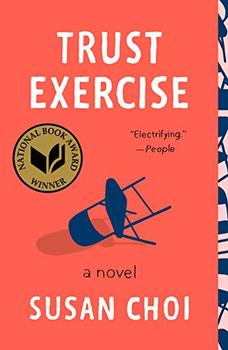Summary | Excerpt | Reading Guide | Reviews | Beyond the book | Read-Alikes | Genres & Themes | Author Bio

A Novel
by Susan ChoiPulitzer finalist Susan Choi's multi-part, narrative-upending novel.
In an American suburb in the early 1980s, students at a highly competitive performing arts high school struggle and thrive in a rarified bubble, ambitiously pursuing music, movement, Shakespeare, and, particularly, their acting classes. When within this striving "Brotherhood of the Arts," two freshmen, David and Sarah, fall headlong into love, their passion does not go unnoticed―or untoyed with―by anyone, especially not by their charismatic acting teacher, Mr. Kingsley.
The outside world of family life and economic status, of academic pressure and of their future adult lives, fails to penetrate this school's walls―until it does, in a shocking spiral of events that catapults the action forward in time and flips the premise upside-down. What the reader believes to have happened to David and Sarah and their friends is not entirely true―though it's not false, either. It takes until the book's stunning coda for the final piece of the puzzle to fall into place―revealing truths that will resonate long after the final sentence.
As captivating and tender as it is surprising, Trust Exercise will incite heated conversations about fiction and truth, and about friendships and loyalties, and will leave readers with wiser understandings of the true capacities of adolescents and of the powers and responsibilities of adults.
Trust Exercise's impressiveness lies in its inability to be defined. It's about the stories women tell themselves to explain their difficult relationships and encounters with men. It's about the intensity of being a teenager, and the extreme depth of emotional experience that occurs without an understanding of what it means to who you are and who you will become. Susan Choi's latest release is a masterful, introspective look at the impact high school has on shaping, not only the person you are, but the narratives you construct...continued
Full Review
(578 words)
This review is available to non-members for a limited time. For full access,
become a member today.
(Reviewed by Meara Conner).
 A large part of the later chapters of Susan Choi's Trust Exercise revolves around the publishing of a female narrative of past sexual assault, forcing other characters in the story to reckon with their own complicity in the event (or lack thereof). The empowerment of survivors telling of their own stories is a concept that today's public is very familiar with – the #MeToo movement has garnered significant attention in the past several years because it provides survivors with a safe platform from which to bring their narratives to light and holds perpetrators of their assaults accountable in a public space.
A large part of the later chapters of Susan Choi's Trust Exercise revolves around the publishing of a female narrative of past sexual assault, forcing other characters in the story to reckon with their own complicity in the event (or lack thereof). The empowerment of survivors telling of their own stories is a concept that today's public is very familiar with – the #MeToo movement has garnered significant attention in the past several years because it provides survivors with a safe platform from which to bring their narratives to light and holds perpetrators of their assaults accountable in a public space.
As the movement has gained traction in the public sphere, the tenets of #MeToo have become more obviously noticeable in today's...
This "beyond the book" feature is available to non-members for a limited time. Join today for full access.

If you liked Trust Exercise, try these:

by Michelle de Kretser
Published 2025
A new novel of startling intelligence from prizewinning Australian author Michelle de Kretser, following a writer looking back on her young adulthood and grappling with what happens when life smashes through the boundaries of art.

by Mischa Berlinski
Published 2025
An exuberant, darkly humorous novel by the National Book Award–nominated author of Fieldwork.
To make a library it takes two volumes and a fire. Two volumes and a fire, and interest. The interest alone will ...
Click Here to find out who said this, as well as discovering other famous literary quotes!